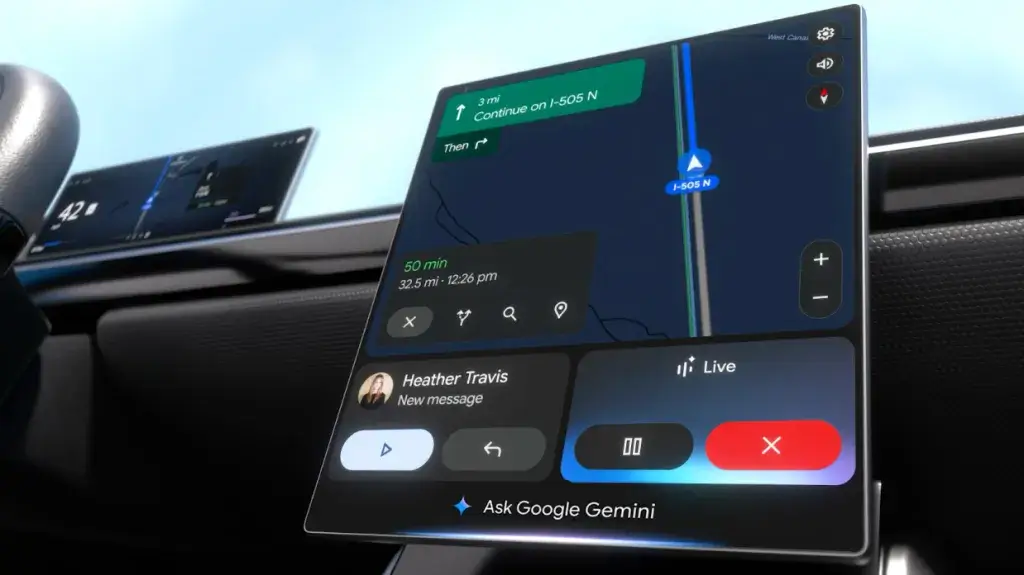
Google is preparing to introduce its powerful generative artificial intelligence system, Gemini, into every car that supports Android Auto within the coming months. The company made the announcement ahead of its annual I/O developer conference, during its Android Show, signaling a sweeping shift in the in-car technology experience.
According to Google, integrating Gemini into Android Auto — and later this year into vehicles running Google’s built-in operating system — will significantly enhance how drivers and passengers interact with their vehicles. The AI system, which combines the natural language processing power of Google’s most advanced models, is expected to make driving “more productive — and fun,” the company wrote in a blog post.
Patrick Brady, Google’s vice president of Android for Cars, said during a media briefing that the integration of Gemini marks a milestone in automotive innovation.
“This is really going to be, we think, one of the largest transformations in the in-vehicle experience that we’ve seen in a very, very long time,” Brady said.
Smarter, More Human-Like Assistance on the Road
Gemini will appear in Android Auto in two primary ways: as a significantly enhanced voice assistant and as an always-on conversational AI interface called “Gemini Live.”
The AI will initially replace many functions currently handled by Google Assistant, but with a major upgrade in user interaction. Thanks to its natural language capabilities, Gemini won’t require users to speak in robotic or command-based phrasing. Instead, drivers — or passengers — can ask Gemini to perform tasks such as sending messages, playing music, or navigating to destinations in a more conversational and intuitive way.
Brady emphasized that Gemini doesn’t require voice matching and will respond to any person using the system, regardless of whose phone is powering the Android Auto experience.
ADVERTISEMENT
Gemini can also remember preferences, such as a contact’s preferred language, and translate messages accordingly. One highly touted feature will allow users to ask for restaurant recommendations along a planned route. Unlike traditional systems, Gemini will pull from Google’s vast database of listings and reviews to handle more complex requests, such as “Find taco places with vegan options within 15 minutes of my stop.”
“Gemini Live” Promises Continuous, Context-Aware Conversations
The second and perhaps most ambitious feature is “Gemini Live,” a mode in which the AI remains continuously available for open-ended conversation. Brady described it as an ever-present digital co-pilot capable of chatting about a wide range of topics — from helping plan a spring break trip to brainstorming kid-friendly dinner recipes or even discussing Roman history.
While the idea of an AI that’s always listening might sound potentially distracting, Brady argued that the goal is quite the opposite.
“Gemini’s natural language understanding actually reduces cognitive load,” he said, claiming that simpler and more intuitive interactions will allow drivers to stay more focused on the road.
That assertion comes at a time when automotive design is facing increased scrutiny from both regulators and consumers. Many drivers are voicing concerns about the growing reliance on touchscreens and digital controls, instead favoring a return to tactile buttons and knobs. Automakers like Volkswagen and Hyundai have responded by reintroducing physical controls in newer models.
Cloud-Based for Now, But Onboard Processing in the Works
Initially, Gemini will function using cloud-based processing, meaning commands and interactions will be relayed through Google’s servers. However, Brady revealed that Google is working closely with automakers to equip vehicles with more onboard computing power. The eventual goal is to allow Gemini to run “at the edge,” or directly within the vehicle, which would improve responsiveness and allow the AI to function even when cellular connectivity is limited.
ADVERTISEMENT
“Moving to edge computing will help with both performance and reliability,” Brady said, noting the importance of stability in environments like vehicles, where signal strength can vary dramatically depending on location.
When asked whether Gemini will eventually incorporate data from vehicle sensors or cameras, Brady said there are no official announcements yet — but acknowledged ongoing discussions within the company.
“As cars have more and more cameras, there are some really interesting use cases in the future here,” he said, hinting at potential for deeper AI integration down the road.
Global Rollout and Language Support
Google confirmed that Gemini on Android Auto and vehicles with Google Built-In will launch in all countries where its generative AI is already available. The system will support more than 40 languages at launch, ensuring widespread accessibility for global users.
The announcement positions Google to further cement its dominance in the automotive technology space, where its partnerships with major automakers — including Volvo, General Motors, and Honda — have already brought Google services to millions of dashboards worldwide.
